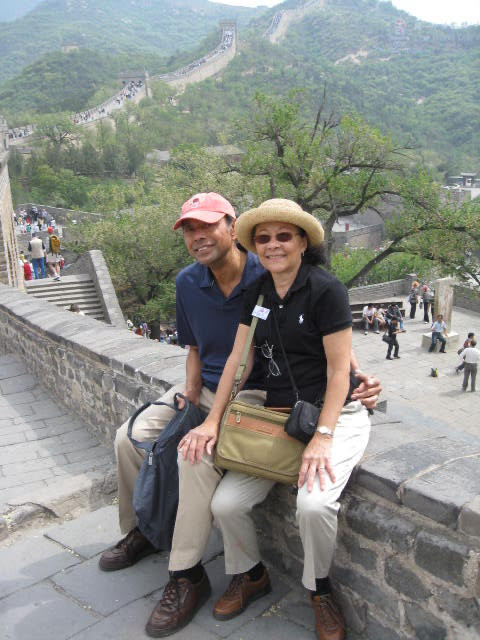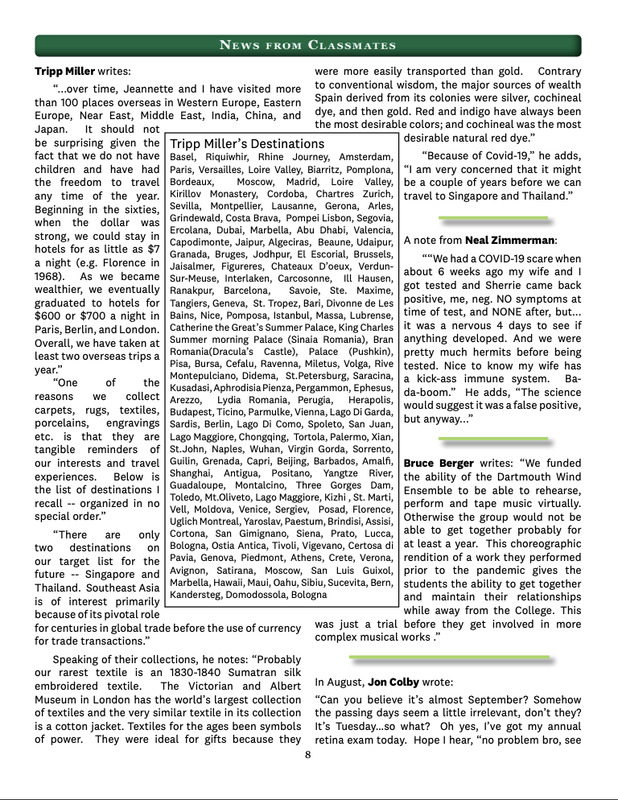Mobility: Life Abroad and Return to the States
Stanford B-School
After graduating Dartmouth in 1966, Tripp attended the Stanford Graduate School of Business for two years. He originally attended because he had thought the university had a similar environment to the University of California, Berkeley, but found himself in league with a very different sort of student. As he describes it, he quickly fell in with the "Ivy League contingent," students from Yale, Princeton, and Dartmouth who came from wealthy and entrepreneurial families. Of the graduates from the business school in 1968, twenty-two were also Dartmouth alums. Tripp was the only Black student in his class. Though he reminisces fondly about his days at Stanford, particularly for the bachelor parties he had with his classmates, he still prefers the academic rigor and quality of education at Dartmouth. In his interview, Tripp highlighted the distinction between professors and instructors, with only the former permitted to teach at Dartmouth. He felt much closer and more engaged with the professors at Dartmouth.
A couple semesters shy of graduation, Tripp married Jeannette, and she moved with him to graduate housing at Stanford, finishing her M.S. degree while he completed his M.B.A. Tripp was recruited by J.R. Geigy A.G., the influential and long-established European pharmaceutical and herbicide company (later merged with other companies and now called Novartis). The company sought an American financial analyst who had studied German. Tripp, having studied German, Latin, and French, took the opportunity, moving with his new wife to Basel, Switzerland. Jeannette had received a reference letter from a Northwestern University professor from Basel and with that connection — and her German-speaking skills — she was able to find a job at Roche (F. Hoffman-La Roche A.G.) within about five days of arrival. The newlyweds would spend their first years abroad in Europe. With the flexibility afforded by the company, the pair took a month off to celebrate their honeymoon, visiting myriad cities throughout Western Europe.
Marriage and Life in Basel
Working for J.R. Geigy A.G. provided Tripp with more than just travel and economic opportunity. Tripp recalled being immersed in the rich culture and history of the various places he visited, but he also quickly picked up on their racial dynamics. Basel itself had a dark history and strong undercurrents of antisemitism. His company’s building was used by I.G. Farben, the entity Adolf Hitler and Albert Speer (Reich Minister of Armaments and Munitions) had consolidated from several other businesses. I.G. Farben operated with enslaved labor during World War II and also produced Zy-Klon B for gas chambers in concentration camps. The nearby Kunst Museum acquired many of its pieces from fleeing Jewish families. While questions of his own race seldom arose, he noticed how much “Jewish” was used in discourse to describe stores and parts of town.
Such was not the case just for Basel, but for every place the couple travelled. From Germany to France to China and to India, each country has its own form of discrimination and cultural hierarchy. Racism, it turned out, was not a distinctly American or even Western European phenomenon.
“Well, one thing we learned in Europe was that there was much discrimination among the Europeans. For example, in Belgium the Flemish discriminate against the French and vice versa. And the Italians of Northern Italy discriminate against the Southern Italians. So, we actually thought the US was pretty good. [Laughter] So we had no problem coming back to the US because we were privy to all the discrimination going on in Europe. And most Americans who travel to Europe don't know that about Europeans and don't think about that.”
— Tripp Miller
Traveling throughout the world and visiting dozens of cities, Tripp's early tastes for high culture — art, music, and history — were allowed to flourish. Tripp and his wife collected prints, rugs, and textiles from all of their travels, and continue to do so to this day. The appeal, Tripp says, lies in the history behind the design. No design, no piece of culture, can stand on its own. Inevitably, cross-cultural influences spread, and superficial claims about cultural ownership or originality dissolve. Not only are the works he and his wife collect beautiful, but they are a reminder of how fluid culture and society are, and how easily hierarchies and categories can be inverted. In our interview, Tripp used the example of a Mughal rugs from Rajasthan: When the Mughals of India invaded Persia, they displaced talented Persian artisans. These artisans would go to Rajasthan to make their living, designing and producing rugs for the Mughals. In a distinctly historical sense of irony, you had Mughals buying the highest-end "Mughal" rugs from Persian artisans.
Economic Mobility and Workplace Experiences
Though Tripp downplays his entrepreneurial drives, his success in the corporate world cannot be understated. Upon moving back in the States, Tripp successfully closed deals at McGraw-Hill, McKinsey, and more, leading an acquisition team and achieving the position of vice president at the age of 35. And while he reflects positively on his career and experiences, his route to success was not without the occasional hiccup. He recounts one instance of frustration with a partner who doubted him and resisted working with him on account of his skin color:
“In fact, I was on one engagement where the partner said he didn't want me to work on the engagement because I didn't have the technical skills. And by the time we finished — it was called Operation Improvement — by the time we finished the engagement, I had identified one third of the operating savings. So, when it was his turn to do a review of me, he said he has good technical skills, but he has no interpersonal skills.”
Tripp emphasized that he never let incidents of discrimination impede his career decisions or prompt self-doubt. In fact, Tripp at times found himself unimpressed with his employers’ leadership and their misguided decisions.
Decades later, Tripp and Jeanette found themselves back in New York City. Jeannette earned a Ph.D. at New York University School of Medicine and retired after a long career as a scientist and Associate Professor of Psychiatry at NYU. While they are not active in alumni circles, either at Stanford or Dartmouth, they both continue to play their part in endorsing multiculturalism and education. In his retirement, Tripp became program director of the oldest textile society in New York City, Haji Baba, and his wife the secretary.


